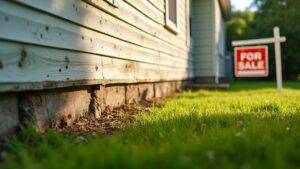Selling a hoarder house in Virginia can feel overwhelming. These homes often need more work than most buyers are willing to handle. The mess and clutter can scare off traditional buyers and lower your property’s value.
The longer you wait to sell, the more stressful the situation becomes. Repairs and cleanouts cost time and money you may not have. You may also worry about legal requirements and finding buyers who will accept the home as-is.
You can sell a hoarder house in Virginia for cash quickly by targeting cash buyers who buy homes as-is. You do not need to make repairs or empty the house.
This approach helps you save time and avoid extra expenses. This blog will show you each step to sell your hoarder house for cash and move forward with confidence.
Key Takeaways
- Contact local, reputable cash buyers or investors who purchase hoarder houses as-is and request multiple no-obligation offers.
- Disclose all known structural, safety, and pest issues honestly on Virginia’s required Residential Property Disclosure Statement.
- Clear walkways and remove major hazards to improve appeal, but deep cleaning or repairs are not required for cash sales.
- Review buyers’ proof of funds, online reputation, and contract terms to ensure a legitimate, fair, and fast transaction.
- Cash sales close quickly, often within a week, with no commissions, repairs, or traditional listing hassles.
Understanding What Qualifies as a Hoarder House
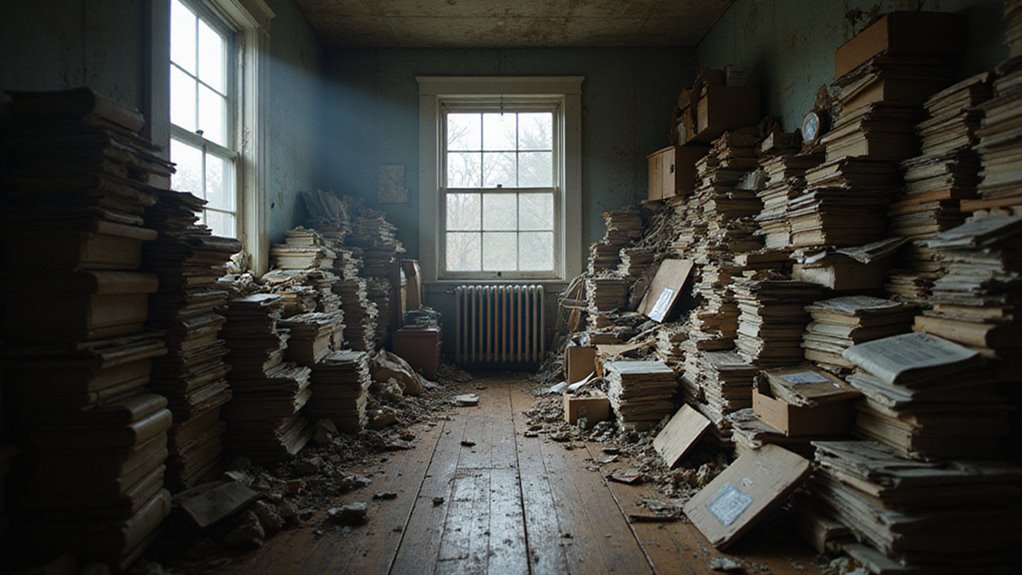
A hoarder house is not just a messy home. It is a place where people cannot throw things away, no matter their value. This causes large piles of stuff and rooms that cannot be used.
If a home is a hoarder house, daily life often becomes hard. Pathways may be blocked, and some rooms may be unsafe. Normal cleaning methods usually do not work because people feel strong attachments to items. Often, homes that struggle with severe clutter may also face property liens due to unpaid taxes or bills that pile up over time.
You should ask if the home is safe and if normal activities can happen there. If the answer is no, the house may be a hoarder house. Early recognition can help you find the right help and make selling easier.
It’s also important to remember that hoarding reduces property value, which can make selling even more challenging.
Assessing the Condition of Your Property
To assess your property’s condition, look at its structure, safety, and clutter. Make a clear list of all issues you find. This helps you know what needs fixing before selling. If the outside looks messy, buyers may think the home is worth less. Overgrown plants, broken siding, or visible junk lower curb appeal.
If you address these, you might boost the home’s value. Inside, check for blocked doors or hidden damage. Take photos and note problem areas that need repairs or cleaning. If you organize this information, you can plan what to do next. Identifying quick appeal fixes such as fresh paint or cleaning exteriors can make your home more inviting to buyers, especially if a full cleanout isn’t possible.
Full home staging may not be possible, but small fixes can help. Simple changes often make a big difference. A careful review lets you set realistic goals for selling the property. If your property has hidden safety hazards, make sure to document them thoroughly, since uncovering these issues early helps avoid legal complications and supports complete disclosure when selling.
Weighing Your Selling Options
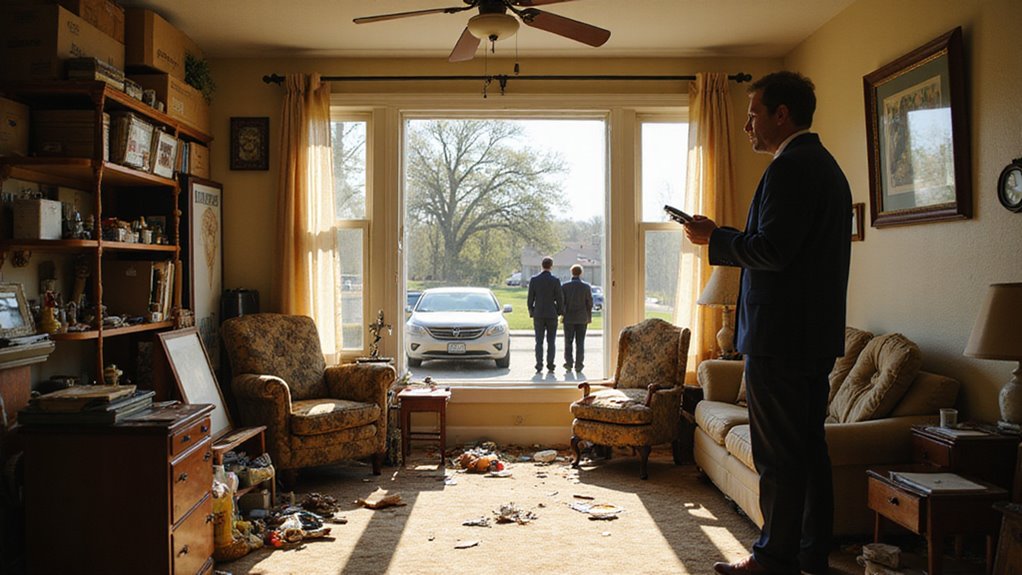
When selling a hoarder house in Virginia, you need to weigh the pros and cons of each selling route. Traditional realtor listings often face longer timelines and higher repair demands, while direct cash buyers can offer fast, as-is purchases with fewer complications.
Auction sales provide another path, with the formidable potential for quick transactions but less control over final price. Cash home buyers often specialize in purchasing properties as-is, letting you skip repairs, cleaning, or dealing with problem tenants.
By considering the benefits of all-cash offers with no agent commissions, you may find that selling to a local cash home buying team is both quicker and financially advantageous compared to traditional methods.
Traditional Realtor Listing Challenges
Selling a hoarder house with a traditional realtor in Virginia is difficult. Most buyers want clean, move-in ready homes. If a house is packed with stuff, buyers may not see its true value.
Professional staging and photos are hard to do in cluttered rooms. This makes it tough to attract interest from buyers. If a home is not staged, buyers may struggle to picture living there.
Many lenders will not approve a mortgage if the house is in poor condition. This can shrink the pool of potential buyers. If you list a hoarder house, you may face delays and lower offers.
Costly repairs are often needed to meet buyers’ and lenders’ standards. If you cannot make repairs, selling may take longer. The traditional listing process is usually more complicated for hoarder homes.
Direct Cash Buyer Advantages
Direct cash buyers offer a fast and simple way to sell your house. They buy homes as-is, so you do not need to make repairs. If you want to avoid cleaning out a hoarder house, this is a good option.
Cash sales usually close 30–50% faster than traditional sales. Homeowners can save time and avoid delays. Some buyers may also handle disposal in eco-friendly ways, like recycling instead of dumping everything.
If your property is hurting neighborhood values, a cash sale can solve that quickly. Direct sales mean no agent fees and clear terms. This approach is helpful if you face urgent or difficult situations.
Auction Sale Considerations
Auction sales can be a good way to sell a hoarder house in Virginia. Sellers often choose auctions to get quick results and encourage competition among buyers. If fast sale or less negotiation is important, auctions may suit your needs.
Auctions create urgency, which can help raise the final selling price. Estate planners may find auctions helpful for quickly dividing assets. If you want less hassle, auctions can make the process smoother.
A property appraisal is needed before the auction to set a fair reserve price. This protects your interests and shows buyers you are transparent. Virginia’s auction process is regulated, so you may close your sale in weeks. If you want a fast sale, market-based pricing, and a simple process, auctions are a good option.
Benefits of Selling for Cash
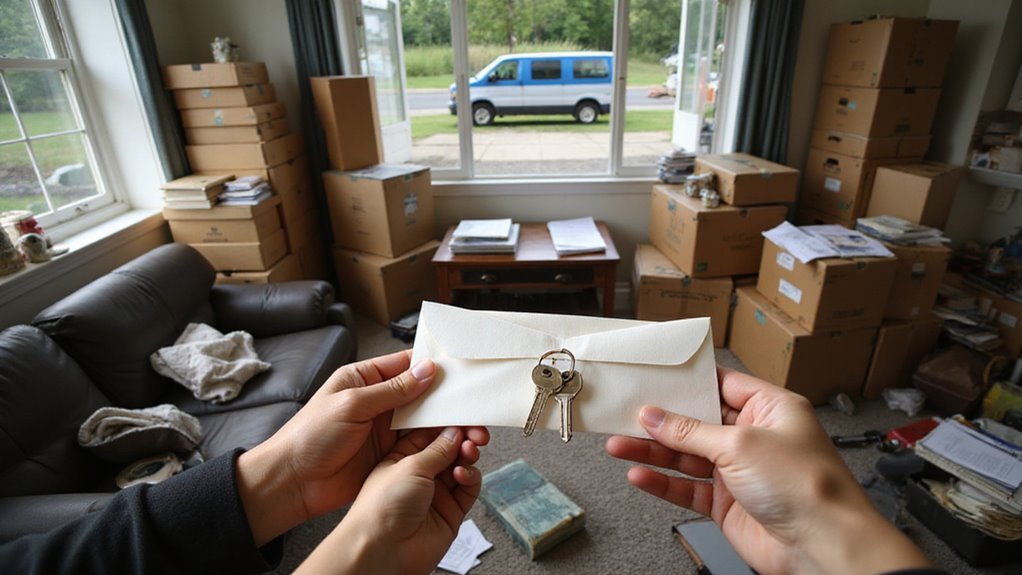
Selling a hoarder house for cash in Virginia is often the easiest way to sell quickly. Cash sales avoid the delays of bank loans. This method is much faster than traditional sales.
Cash buyers usually take homes as they are, so you do not need to clean or fix anything. If the house has hazards or damage, you can still sell it. This saves you time and money on repairs. When setting your price, it’s helpful to analyze comparable sales in your local area, as this ensures your asking price is competitive even if the home needs extensive work.
Industry reports show cash deals close about 50% faster than financed ones. Faster closings reduce your costs for utilities and maintenance. If you want to move on soon, a cash sale can help.
Selling for cash can also make the process less stressful. If you have emotional ties to the home, a quick sale avoids long negotiations. This method gives you certainty and a clear closing date.
If you want an easy, simple sale, a cash offer is a good choice. Cash sales help you avoid many common problems. You can move forward with less hassle and worry.
One added benefit of selling to a cash buyer is that as-is sales attract investors and renovators who seek properties in any condition, making it easier to sell even if your house needs extensive work.
Finding Reputable Cash Buyers in Virginia
To get the best results when selling a hoarder house, you’ll want to connect with reputable cash buyers in Virginia. Focus on established local real estate investors and trusted house-buying companies, as data shows they often close deals quickly and with fewer contingencies. By targeting these buyers, you can streamline the sale and avoid common pitfalls.
Many cash buyers in Virginia specialize in purchasing properties as-is, allowing you to avoid repairs, hidden fees, or the need for costly upgrades before selling. It’s important to note that disclosing property issues is legally required in Virginia, and doing so helps build trust with potential buyers and ensures a smoother transaction.
Local Real Estate Investors
Local real estate investors can make selling a hoarder house in Virginia easier. They often buy homes as-is and pay cash. If you want a fast sale, these investors are a good choice.
Most investors understand the challenges of hoarder houses. They will not be bothered by clutter or mess. Investors usually do not require repairs or deep cleaning.
If you accept a cash offer, you can avoid long negotiations. Investors know Virginia’s rules and follow them closely. This helps the sale go smoothly and legally.
Their experience with distressed homes is helpful if your house needs work. If you want less stress, working with a local investor can be a smart option.
House-Buying Companies
To quickly find reputable cash buyers for a hoarder house in Virginia, start with house-buying companies. These companies often have experience handling difficult properties. You can avoid repairs and sell the house “as-is.”
Check online reviews and Better Business Bureau ratings for each company. Local testimonials can also help confirm their reputation. If possible, ask for proof of funds before agreeing to any offer.
Many sellers choose “We Buy Houses Virginia” companies for faster sales. Most of these sales close in about a week. You can also promote your house on local real estate forums to attract more buyers.
Always review contracts carefully before signing. If a company is not transparent, consider choosing another one. Careful research and due diligence can help you get a fair cash offer.
How to Get a Fair Cash Offer
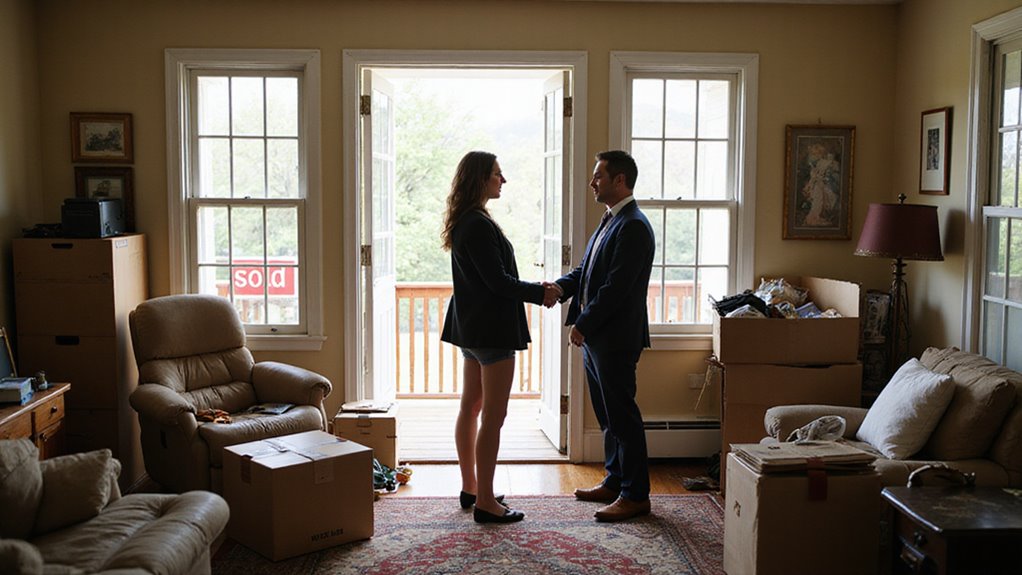
To get a fair cash offer, you need to know your home’s real value. Check recent sales of similar homes in your area. This helps you set a fair price. Know your home’s true value by looking at recent sales of similar properties nearby to help set a fair price.
If your house is cluttered, try to clear main pathways or remove safety hazards. These small steps can make your home look better to buyers. You do not need to fully clean or renovate. In Shenandoah, you can sell your house in any condition and still receive fair offers from experienced buyers.
Contact several local cash buyers to get multiple offers. Compare each offer’s price, terms, and any conditions. If you can, use this information to negotiate a better deal.
Always check if a buyer is trustworthy before accepting an offer. You should avoid buyers who seem suspicious or unwilling to share details. If you’re careful, you can find a fair and honest offer.
Many local cash buyers will submit a no-obligation all-cash offer for your house in any condition, and often close in as little as seven days with no commissions or hidden fees.
What to Disclose to Potential Buyers
You need to disclose the true condition of your hoarder house to potential buyers to comply with Virginia law and avoid future legal issues. Be upfront about any structural problems and provide records of past pest infestations, as 81% of buyers consider transparency crucial in their decision-making.
Making disclosures about things like odors or clutter can reassure buyers that you’re taking steps toward decluttering and depersonalizing, which research shows can help homes sell faster. Accurate disclosures protect you from liability and help you attract serious, qualified buyers. Virginia law also requires sellers to disclose any known mold or water damage to ensure compliance and reduce legal risks during the sale.
Disclosing Property Condition Honestly
Virginia law requires sellers to give buyers a Residential Property Disclosure Statement. This form lists any known problems with the house. Sellers must be honest about issues like broken appliances or needed repairs.
If you hide problems, you could face legal trouble or lose your sale. Always document repairs and note anything that still needs fixing. You should also describe any clutter or damage from hoarding.
Being honest makes your property more appealing to cash buyers. Buyers looking for investment or renovation projects value clear information. Full disclosure helps you avoid disputes later.
Notifying About Structural Issues
You must tell buyers about any known structural issues in Virginia. This includes foundation cracks, roof problems, or weak walls. Virginia law requires these disclosures to avoid legal trouble.
If you hide these issues, you could lose your sale or face a lawsuit. Structural problems usually lower your home’s value. You should write down any past or present concerns.
Investors who buy homes for cash will check the cost of repairs before making an offer. Being honest about defects can prevent last-minute changes to the deal. Clear disclosures also help build trust and speed up the sale.
Sharing Pest Infestation History
Virginia law requires you to tell buyers about any past pest problems. This includes issues with termites, rodents, or insects. Being honest protects you from legal trouble and helps build trust with cash buyers.
You must give clear details if your house had pests before. List what type of pest was present, when it happened, and what you did to fix it. Buyers want this information to feel secure about their purchase.
If you do not disclose pest history, you could face legal issues later. A record of pest treatment can make your house easier to sell. Sharing this upfront can also speed up negotiations.
| Pest Type | Date of Infestation | Remediation Actions |
|---|---|---|
| Termites | March 2023 | Treated, wood replaced |
| Rodents | July 2022 | Extermination, sealed gaps |
| Cockroaches | October 2021 | Professional pest control |
Always give this information early in the selling process. This helps protect you and makes the sale smoother.
Navigating Virginia’s Real Estate Laws
Virginia has strict rules for selling real estate. Sellers must understand these laws before listing a hoarder house. Doing so helps avoid delays and legal problems.
Sellers must disclose all known defects in the home. They should be honest about any issues found during repairs or estate planning. Virginia law also requires a property disclosure statement.
The title must be clear and without liens. Sellers must confirm this before listing the property. Any unresolved liens can stop the sale.
If you made renovations, you need proper permits. Always check that permits are in place for work done. Missing permits can cause legal trouble.
If the house is part of an estate, all heirs must approve the sale. Sellers should gather written consent from all heirs. This step is essential to prevent future disputes.
Following these laws makes selling much easier. Understanding each step protects you from costly mistakes. If unsure, consider speaking with a local real estate attorney.
It’s especially important to address any legal and disclosure considerations when dealing with possible pest or termite issues, as Virginia law requires honest disclosure and failure to do so can result in penalties.
Preparing the House for a Cash Sale
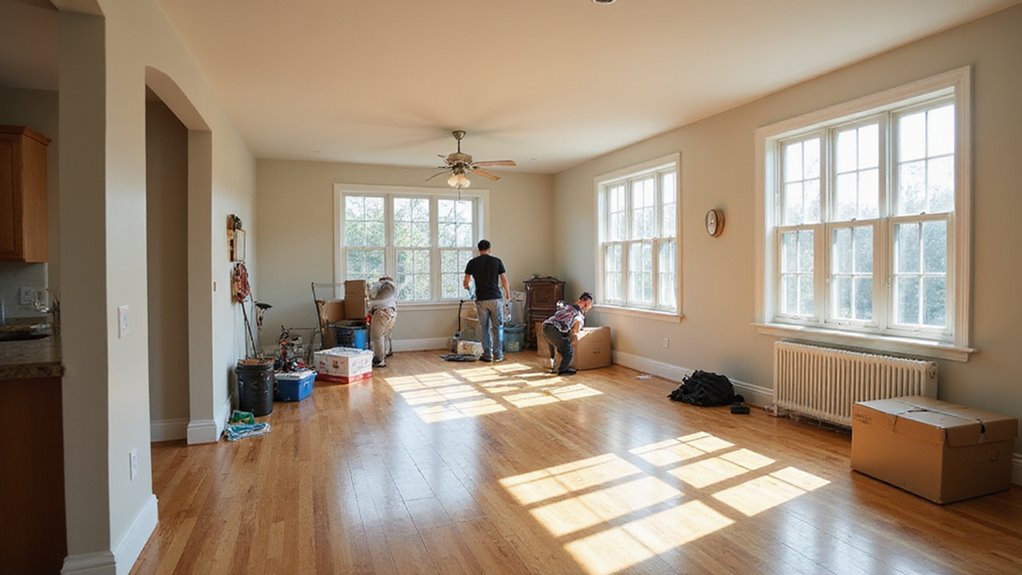
To prepare a hoarder house in Virginia for a cash sale, focus on making the home look clean and inviting. Improve the outside first, as buyers notice curb appeal right away. If you mow the lawn and pick up trash, buyers may see more value in the home.
Inside, clear walkways and let in natural light. If you move furniture and remove clutter, buyers can see the home’s layout better. Use basic staging to help buyers picture living there.
If you cannot make the house perfect, a simple and tidy look is enough. Buyers want easy access to each room and a smooth sale process. Clean spaces often lead to faster and stronger cash offers.
Handling Personal Belongings and Valuables
You’ll need a systematic approach to sort valuable items, donate or dispose of unwanted contents, and secure any sensitive documents. Studies show that organized handling of personal property can reduce sale timelines by up to 30%. Prioritizing these steps helps you protect assets and streamline the selling process.
Sorting Valuable Items
Sorting valuable items is important when getting a hoarder house ready for sale in Virginia. This step helps you find things that may increase the home’s value. If you skip this, you might miss out on extra money.
You should check each room one at a time. Use boxes or bins to store items you want to keep or review later. Organized spaces often lead to quicker and better sales.
Start by looking for jewelry, antiques, or collectibles that could be worth money. Keep important documents in labeled folders for easy access. Put electronics and small valuables in clear bins.
Take photos of valuable items to create a record. These photos can help with insurance or future appraisals. If you think something is valuable, set it aside for an expert to check.
Donating or Disposing Contents
After removing valuable items, decide what to do with everything else. If items are still useful, consider donating them. Throw out anything that cannot be reused or recycled.
Divide the house into zones and clean one area at a time. Use labeled bins to sort items for donation, recycling, or trash. Consistent sorting and cleaning can make the process much faster.
Local charities, such as Goodwill and Habitat for Humanity in Virginia, accept household goods. If you have many items, you can schedule a donation pickup. Hire junk removal services for items that cannot be donated or recycled.
Efficient sorting and disposal help make the property look better. If you plan to sell, a clean house attracts more buyers. This process can save you time and effort.
Securing Sensitive Documents
Securing sensitive documents is important when cleaning a hoarder house. These papers can include birth certificates, bank statements, and passports. If you do not secure them, there is a risk of identity theft or fraud.
Collect all personal identification and financial papers right away. Place them in a lockable box or safe for temporary safety. If papers are outdated, shred them to protect your information.
You can take photos or scan important documents for backup. Store digital copies in a secure location. If you find valuables like jewelry, store or appraise them safely.
Taking these steps helps protect your identity and finances. Proper handling of sensitive items can prevent legal and financial trouble. If you are unsure, ask a professional for guidance.
Managing Emotional and Family Dynamics
Managing the emotional and family dynamics of selling a hoarder house in Virginia requires understanding and planning. Family members may feel sad, stressed, or overwhelmed. Clear steps can help everyone stay focused on the sale.
A family meeting allows everyone to discuss goals and concerns. Each person should have a role and know their responsibilities. This can help reduce confusion and arguments.
If conflicts arise, a neutral mediator or counselor can help. Emotional support is important, but decisions must keep the sale moving forward. Open communication and honesty help the family work as a team.
Avoiding Common Mistakes During the Sale
Selling a hoarder house in Virginia can be tricky. Sellers often lose money or face delays by making avoidable mistakes. Knowing what to watch out for helps you save time and get better offers.
Many people ignore cleaning advice that targets clutter and bad smells. Simple home staging can make a big difference in how buyers see the house. Even small changes may lead to higher offers.
If you do not reveal property problems, you could face legal trouble later. Pricing the house based on feelings instead of the market can drive buyers away. Always check references if you plan to sell to a cash buyer. If you take care of these issues early, you can sell your house faster and for more money.
The Timeline for a Cash Sale
A cash sale usually closes much faster than a traditional sale. Most cash deals finish in 7 to 21 days. You do not wait for bank approvals or spend time on home staging.
A good pricing strategy attracts buyers who want speed and certainty. Serious cash buyers prefer simple and quick transactions. Sellers often experience less stress during the process. If you want to close quickly, consider a cash sale. The table below shows the main differences:
| Timeline | Traditional Sale | Cash Sale |
|---|---|---|
| Average Days | 60–90 | 7–21 |
| Staging Needed | Yes | Rarely |
| Stress Level | High | Lower |
Next Steps After Closing the Sale
After closing the sale, you still have important tasks to finish. These steps help ensure a smooth transition. Proper follow-up protects your interests.
You should collect all closing papers and keep them safe. If you forget, you may need these documents later. Notify utility companies to transfer or cancel services.
Settle any unpaid property taxes or city fees quickly. Delays could cause future problems or extra costs. Review your selling experience to improve your next sale.
If you plan to buy again, consult a property expert. This can help you make better decisions. Taking these actions will give you a clear and confident fresh start.
Conclusion
If you need to sell a hoarder house in Virginia, a cash sale can be a smart choice. You can avoid many repairs and speed up the process. If you choose a reliable buyer, you will reduce stress and uncertainty.
We buy houses for cash, no matter the condition or situation. If you work with us, you can expect honesty and a quick closing. We understand the unique challenges of selling a hoarder home.
If you want a simple and fast sale, Align Real Estate Solutions is ready to help. We encourage you to contact us today. Let us turn your property challenge into a fresh start.
Author
-

Zach Koops is co-founder and Real Estate Success Manager at Align Real Estate Solutions, serving homeowners across Virginia since 2024. With a passion for real estate and a heart for people, Zach has built his career around helping sellers navigate tough situations—foreclosure, inheritance, relocation, repair-overload—with clarity and compassion. He’s known for being straightforward, steady under pressure, and deeply invested in relationships. Outside of work, he spends his time as a husband and father, enjoys the outdoors in Shenandoah Valley, loves singing on stage, and constantly seeks growth through reading and new experiences.



